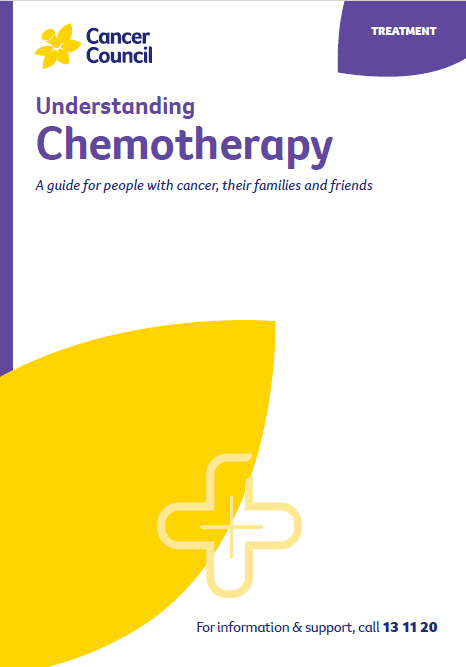Chemotherapy for myeloma
Chemotherapy is the treatment of cancer with anti-cancer drugs called cytotoxics. The aim of chemotherapy is to kill cancer cells while doing the least possible damage to healthy cells. The most commonly used chemotherapy drugs for myeloma include melphalan, doxorubicin and cyclophosphamide.
Learn more about:
How it is given
Some people can have all their chemotherapy as tablets. Others have the drugs injected into a vein (intravenously) or under the skin (subcutaneously). You may need to stay in hospital while having some chemotherapy treatments, but this stay is usually short. Your doctor will tell you about the drugs you are having and how long treatment will last.
You may have chemotherapy in combination with other treatments, such as one of the immunomodulator drugs used for myeloma.
Side effects
Some chemotherapy drugs can cause side effects, such as feeling sick (nausea), fatigue, hair loss, a drop in blood count, mouth sores, diarrhoea and a weakened immune system. In some cases, people may develop peripheral neuropathy (tingling in hands and feet) after chemotherapy.
These side effects are temporary and there are ways to prevent or reduce them. Tell your doctor or nurse about any side effects that you experience. Your doctor may prescribe medicine, consider a break in your treatment, or change the treatment you are having. For more information, see the Managing symptoms and side effects.
Learn more about chemotherapy.
Proteasome inhibitors
Proteasome inhibitors are chemotherapy drugs that block the breakdown of protein within myeloma cells, causing them to stop growing and die. Commonly used proteasome inhibitors for myeloma include bortezomib and carfilzomib. Other drugs may be accessed in certain circumstances.
How they are given – Bortezomib is given as an injection under the skin or into a vein. It is often used together with steroids and chemotherapy. Carfilzomib is given intravenously.
Side effects – Bortezomib and carfilzomib may cause fatigue, diarrhoea, nausea, constipation, low blood counts, infections and shingles. If you have unusual bruising or bleeding, pink urine, or nosebleeds, let your doctor know. Also tell them if you take aspirin, ibuprofen or naproxen. Peripheral neuropathy is common with bortezomib but rare with carfilzomib. Carfilzomib may cause high blood pressure or heart problems, or worsen pre-existing heart conditions.
Video: What is chemotherapy?
Learn more about chemotherapy in this short video.
Podcast: Making Treatment Decisions
Listen to more episodes from our podcast for people affected by cancer
More resources
Dr Ian Bilmon, Haematologist, Westmead Hospital and The Sydney Adventist Hospital (Clinical review); Martin Boling, Consumer; Catherine Bowley, Specialist Myeloma Nurse, Myeloma Australia; Dr Samuel Dickson, Radiation Oncologist, Calvary Mater Newcastle; Rachelle Frith, Clinical Nurse Consultant, Haematology, Prince of Wales Hospital; Dr Wojt Janowski, Haematologist, Calvary Mater Newcastle; Yvonne King, 13 11 20 Consultant, Cancer Council NSW. We would like to thank all the health professionals, consumers and editorial teams who have worked on current and past editions of this title.
View the Cancer Council NSW editorial policy.
View all publications or call 13 11 20 for free printed copies.

